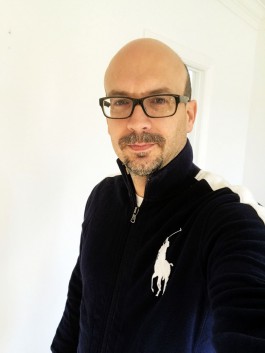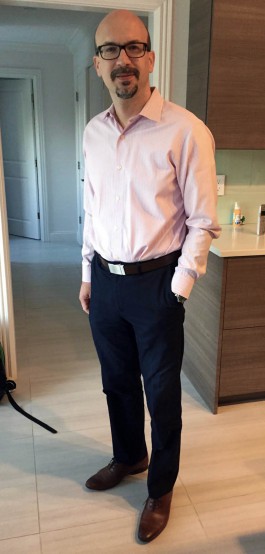
Photographs on this page:
Archive of M. K.
A graduate of the Second Faculty of Medicine Dr. Majed Koleilat runs a private paediatric practice in the U.S.A., worked at a University Hospital in Pennsylvania. He writes an essay about his experience.
There is no big difference between Czech and American medical students, but the American student values their education more. Majed Koleilat says that the Second Faculty of Medicine offered everything that he required.
Majed Koleilat, a graduate of the Second Faculty of Medicine, runs a private paediatric practice in the United States and worked at a teaching hospital in Pennsylvania. He writes here an essay about his experiences.
I come from Lebanon from a medical family, my father a Lebanese paediatrician, my mother a Czech from Prague, and an engineer. Two of my father's brothers are also doctors. All of us studied medicine at the Charles University. My father graduated in the mid 60's from the former Faculty of Children's Medicine – with Professor Švejcar, with who he continued to meet with during his subsequent trips to Prague. I remember how Švejcar auscultated a six-year old boy's heart, was soft and sweet, and later on, his advice full of life experiences and wisdoms. I studied in Prague at the Second Faculty of Medicine from the year 1990 until 1996.
After graduation, I worked at the First children's clinic in Motol, and later I completed my paediatric residence at the American University of Beirut. During that time, I completed a residency at Children's Hospital Boston of the Harvard Medical School and at Duke University at Durham, where I did my attestation in allergy and immunology and gained American Board Certification for paediatrics and allergy/immunology. Altogether, I worked for five years in the teaching hospital in Pennsylvania (Geisinger Medical Center) and for the last ten years I have been running a private practice.
 When I compare my experiences with Czech and American medical education, I can find some differences. On average, there is not a great difference between Czech and American medical students. The American student values their education more, knowing the price and the costs of the studies. If they hold a diploma after graduation, each graduate owes on average 160 thousand dollars. Students can however find loans, and pay them back over a period of ten to fifteen years after graduation. As full doctors they have such salaries that they can well afford to pay back the loans.
When I compare my experiences with Czech and American medical education, I can find some differences. On average, there is not a great difference between Czech and American medical students. The American student values their education more, knowing the price and the costs of the studies. If they hold a diploma after graduation, each graduate owes on average 160 thousand dollars. Students can however find loans, and pay them back over a period of ten to fifteen years after graduation. As full doctors they have such salaries that they can well afford to pay back the loans.
As the basic college education is only four years in the United Sates, it's very intensive, with clinical practice being common even after five in the afternoon! At the larger universities there is a strong emphasis on contact with the educators, in small group and individual study. The American medical student in comparison with the Czech one spends more time daily at both the university and at the hospital. On the other hand, the total number of educational hours approximately compares with those spent at the Prague faculty, as the education is significantly more intense. In the USA, there is a greater emphasis on practice at the bedside, not only ‘knowledge’, but also ‘skill’; students must be present for all treatments, either to try the procedure under supervision, or at least ‘be there’. In the Czech Republic, there was not such an emphasis on this. If someone wanted to participate in this activity, they could, and if not, the minimum required was less than in the United States. On the other hand, I feel that Czech doctors have more personable relationships with their patients; the difference being that in the USA a significantly higher number of tests are performed, including diagnostic interventions. It is also due to financial reasons. A seriously ill patient in the United States, if they are properly insured, most likely has more possibilities and options for diagnosis and treatment. In terms of prevention, more and more individuals are participating in ‘preventive care’; in both cases it is more expensive, and I am not sure it has a great effect on a healthy population.
As an independently operating doctor, I was very surprised how much a doctor must also be a ‘businessman’, but from former classmates from Prague I know that this trend is happening as well in the Czech Republic. For now, it seems to me that a Czech doctor is still more a doctor than a businessman, whereas in the USA the medical profession has been shifted closer to business.
Study at the Second Faculty of Medicine in Prague offered me everything that I needed. If I was to repeat the process, I would do some things differently or more intensively. I am very grateful that at the Faculty I had good teachers and colleagues.
Majed Koleilat, M.D.